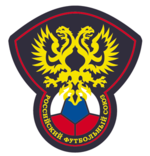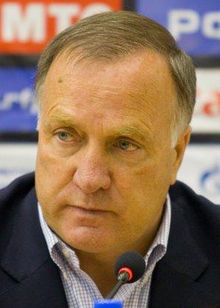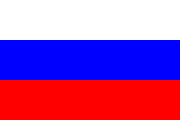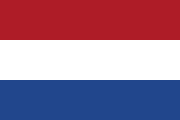Russia national football team
 |
|||
| Nickname(s) | Sbornaya | ||
|---|---|---|---|
| Association | Football Union of Russia | ||
| Confederation | UEFA (Europe) | ||
| Head coach | Dick Advocaat | ||
| Asst coach | Aleksandr Borodyuk | ||
| Captain | Andrei Arshavin | ||
| Most caps | Viktor Onopko (109) | ||
| Top scorer | Vladimir Beschastnykh (26) | ||
| Home stadium | Luzhniki Lokomotiv Petrovsky |
||
| FIFA code | RUS | ||
| FIFA ranking | 16 | ||
| Highest FIFA ranking | 3 (April-June 1996) | ||
| Lowest FIFA ranking | 40 (December 1998) | ||
| Elo ranking | 15 | ||
| Highest Elo ranking | 7 (June-August 2009) | ||
| Lowest Elo ranking | 34 (2005, 2006) | ||
|
|||
| First international | |||
(Stockholm, Sweden; 30 June 1912) (Moscow, Russia; 16 August 1992) |
|||
| Biggest win | |||
(San Marino, San Marino; 7 June 1995) |
|||
| Biggest defeat | |||
|
(Lisbon, Portugal; 13 October 2004) |
|||
| World Cup | |||
| Appearances | 2 (First in 1994) | ||
| Best result | Round 1, 1994 and 2002 | ||
| European Championship | |||
| Appearances | 3 (First in 1996) | ||
| Best result | Semi-finals, 2008 | ||
The Russian National Football Team (Russian: Российский Футбольный Союз, tr. Rossijskij Futbolʹnyj Sojuz) is Russia's primary football team. Russia qualified for two World Cups (1994, 2002) and three European Championships (1996, 2004, 2008). Euro 2008 marks the first time they have passed the group stages of a major tournament, these advances are not counting the USSR national team.
FIFA considers the Russia national team the direct successor of the CIS and USSR national teams.[1]
Contents |
History
After the break up of the Soviet Union, Russia played its first international match against Mexico on August 16, 1992 winning 2-0 with a team of former Soviet Union players from the other republics.
Beginning
Led by manager Pavel Sadyrin, Russia were in Group 5 for the qualification campaign for the 1994 Football World Cup which consisted of Greece, Iceland, Hungary and Luxembourg. The suspension of the Federal Republic of Yugoslavia, reduced the group to five teams. Russia eventually qualified alongside Greece with six wins and two draws. Russia went to the USA to start a new era of Russian football as an independent country. Though not considered to be among the strongest teams in the tournament, Russia were seen as fierce opponents. The Russian squad consisted of veterans like goalkeeper Stanislav Cherchesov, Aleksandr Borodyuk and players like Viktor Onopko, Oleg Salenko, Aleksandr Mostovoi, Vladimir Beschastnykh, and Valery Karpin (some of these players could have chosen to play for example the Ukrainian national football team but the Ukrainian Football Federation had failed to secure recognition in time to compete in the 1994 FIFA World Cup qualification[1]).
In the final tournament, Russia was drawn into group B with Cameroon, Sweden, and Brazil. This was considered a strong group with Russia having limited chances of qualifying for the second round. In their first two games Russia lost 2-0 to Brazil and 3-1 to Sweden. Teetering on elimination, Russia defeated Cameroon 6-1 with Oleg Salenko scoring a record five goals in a single match. Russia was eliminated from the tournament with three points from one win and two losses. Sadyrin was later sacked following what was a poor performance.
Romantsev era
After Sadyrin was sacked, Oleg Romantsev was appointed coach to lead Russia to Euro 96. Romantsev was expected to qualify Russia for the final tournament and perform well. In his squad he selected many players from the 1994 FIFA World Cup like Viktor Onopko, Aleksandr Mostovoi, Vladimir Beschastnykh, and Valery Karpin. During qualifying, Russia overcame Scotland, Greece, Finland, San Marino, and the Faroe Islands to finish in first place with eight wins and two draws.
In the final tournament Russia was in Group C with Germany, Czech Republic, and Italy. Group C was considered the 'group of death' with Russia dubbed the weakest team. Italy beat Russia 2-1. Having lost their first game Russia were not expected to perform well against Germany. To much surprise, though, the first half ended goalless. However Germany went on to win 3-0. Russia's last game against the Czech Republic was to be nothing more than a consolation. The game ended in a 3-3 draw after a late goal from the Czechs, putting them through at the expense of Italy.
1997-1999
After Euro 96, Boris Ignatyev was appointed manager. His goal was to lead Russia to the 1998 FIFA World Cup in France. He used many players from Euro 96 like Viktor Onopko, Aleksandr Mostovoi, and Valery Karpin. In the qualifying stage Russia was in group 5 with Bulgaria, Israel, Cyprus, and Luxembourg. Russia and Bulgaria were considered the two main contenders to qualify from the group with Israel considered a minor threat. Russia began the campaign with two victories against Cyprus and Luxembourg and two draws against Israel and Cyprus. They continued with victories against Luxembourg and Israel. Russia suffered their only defeat of the campaign with a 1-0 loss to Bulgaria. They ended the campaign with a 4-2 victory in the return game over Bulgaria and qualify for the playoff spot. In the playoffs, Russia was drawn with Italy. In the first leg Russia drew 1-1. In the away leg, Russia was defeated 1-0 and failed to qualify for the World Cup.
After failing to qualify for the World Cup in France, Russia were determined to qualify for the UEFA Euro 2000 co-hosted by Belgium and the Netherlands. Anatoliy Byshovets was appointed as Russia manager. Byshovets made very little changes to squad by recalling players from the previous generations. Byshovets did call up striker Alexander Panov. Russia were drawn in group 4 for the qualifying round with France, Ukraine, Iceland, Armenia, and Andorra. Russia and France were considered as favorites for the top two spots with Ukraine being an outside contenders. Russia began their campaign with three straight defeats to Ukraine, France, and Iceland. Outraged by this result, the Russian Football Union immediately sacked Byshovets and reappointed Oleg Romantsev as manager. The reappointment of Romanstev as manager brought an complete turn around to Russia's campaign. They went on to win their next six games including a 3-2 victory over France at the Stade de France. In their last game against Ukraine, Russia needed a win to confirm a place for the playoffs however the game finished 1-1. Russia finished third in the group, failing to qualify for their second major tournament in succession.
Revival
Oleg Romantsev remained as manager of the national team to supervise their qualification campaign to the 2002 FIFA World Cup in South Korea and Japan. In the preliminary stage Russia was in group 1 with Slovenia, FR Yugoslavia, and Switzerland, Faroe Islands, and Luxembourg. Russia were once again considered the favourites to qualify along with either Switzerland or Yugoslavia. Russia finished their campaign in first place to qualify directly managing seven wins, two draws, and a loss.
At the final tournament of the 2002 FIFA World Cup campaign in Korea and Japan, Russia was drawn into group H with Belgium, Tunisia, and Japan. Group H was considered the weakest group of the tournament and Russia were considered serious contenders to qualify for the second round. In their first game Russia achieved a 2-0 victory over Tunisia. Russia lost their next match to Japan 1-0 causing riots to erupt in Moscow.[2] For their last game against Belgium, Russia needed a draw to take them to the second round. Russia lost 3-2 and was eliminated.
Oleg Romantsev was sacked immediately following the tournament and replaced with CSKA's Valery Gazzaev. Gazzaev's task looked difficult as Russia's group consisted of Switzerland, Republic of Ireland, Albania, and Georgia with the Irish considered favourites and an improving Swiss side as an increasing threat. Russia began their campaign with home victories against the Republic of Ireland and Albania. However, they suffered a major setback after losing their next two games away to Albania and Georgia which put Gazzaev's career in jeopardy. He was promptly sacked after a disappointing draw with Switzerland in Basel. Russia managed a 1-1 draw with the Republic of Ireland in Dublin before Georgi Yartsev was appointed manager. Yartsev managed to qualify Russia for a playoff spot with Wales after home victories to Switzerland and Georgia. In the first playoff leg Russia drew 0-0 with Wales in Moscow. In Cardiff, Russia emerged with victory 1-0 from a Vadim Evseev header to qualify for Euro 2004. The victory was overshadowed when Russian midfielder Yegor Titov tested positive for drugs. Amidst calls for Russia to be disqualified, Titov was given a one-year ban on February 15, 2004.
In Euro 2004, Russia was in group A with Greece, Spain, and Portugal. On June 12, the first day of the tournament, Russia lost to Spain 1-0. Four days later, Russia faced hosts Portugal. Portugal went on to win 2-0. In Russia's final game they won 2-1 against Greece as they were eliminated from Euro 2004.
In the 2006 World Cup qualifying tournament, Russia was drawn into group 3 with Portugal, Slovakia, Estonia, Latvia, Luxembourg, and Liechtenstein. Russia began qualification with a 1-1 draw against Slovakia on September 4, 2004 in Moscow. They seemed to pick up some pace with 4-0 win over Luxembourg, but suffered a 7-1 defeat against Portugal in Lisbon. Victories against Estonia and Liechtenstein seemed to put them back on track but a 1-1 draw with Estonia on March 30, 2005 in Tallinn was a major disappointment which saw the end of Georgi Yartsev's reign. It was also one of the greatest results in Estonian football history. Under new manager Yuri Semin, Russia were able to rekindle their hopes with a 2-0 win against Latvia before a 1-1 draw in Riga on August 17, 2005. Russia seemed to redeem themselves with victories against Liechtenstein, Luxembourg and a 0-0 draw against Portugal. In their final game Russia needed to win against Slovakia in Bratislava. After a 0-0 draw Slovakia advanced to the playoffs above Russia on goal difference. Russia finished third with 23 points and suffered their biggest loss ever, 7-1 against Portugal in Lisbon, failing to qualify for the play-offs.
Euro 2008
Having failed to qualify Russia for the 2006 World Cup, Yuri Semin stepped down several weeks later and Russia began looking for a new manager. It was clear that a foreign manager would be needed as most of the high profile Russian coaches were not successful with the national team. On April 10, 2006, it was announced that then Australia manager Guus Hiddink would lead Russia in the Euro 2008 qualification campaign.
For the Euro 2008 qualifying campaign, Russia were drawn into group E with England, Croatia, Israel, Macedonia, Estonia, and Andorra. Led by Guus Hiddink, Russia began their Euro 2008 campaign by drawing with Croatia 0-0 and Israel 1-1 at home. They picked up momentum with a 2-0 win against Macedonia in Skopje, and 2-0 home and away wins against Estonia. On June 2, 2007, Russia defeated Andorra 4-0 in Saint Petersburg with Aleksandr Kerzhakov scoring a hat-trick and an additional goal scored by Dmitriy Sychev. Russia then defeated Macedonia 3-0. Russia's campaign suffered a setback in September 2007 when they lost 3-0 to England at Wembley. In the return game in Moscow, Russia fell to an early goal from Wayne Rooney. During the second half Russia came from behind to win 2-1 with Roman Pavlyuchenko scoring both goals. At the time England were the strongest team defensively in the whole qualifying campaign. On November 17, 2007, Russia suffered a 2-1 defeat to Israel to put qualification hopes in jeopardy. Despite the defeat, Russia still managed to qualify with a 1-0 win over Andorra while England suffered a 3-2 defeat to Croatia, at Wembley. Russia were able to qualify in second place with 24 points, 1 point above England who had 23 points.
Prior to Euro 2008, Russia lost to Romania and defeated Kazakhstan, Serbia, and Lithuania in friendlies, but their win over Serbia came at a price. In the victory against Serbia, then number one striker Pavel Pogrebnyak suffered a severe injury which caused him to miss the entire Euro 2008 tournament.
In the Euro 2008 tournament, Russia were drawn into Group D with Sweden and Euro 2004 group rivals Spain and Greece.
On 10 June Russia was heavily beaten by Spain, 1-4, in their opening Euro 2008 game in Innsbruck. David Villa scored a hat-trick and Cesc Fàbregas added a fourth after Roman Pavlyuchenko had scored a consolation header. Russia quickly rebounded however and won their next game against Greece, 1-0, with Konstantin Zyryanov being the lone goal scorer. The third game at Innsbruck stadium saw Russia as 2-0 victor over Sweden, Roman Pavlyuchenko and Andrei Arshavin having scored. The victory made it possible for the Russian team to qualify further on to the quarterfinals with 6 points, running-up to Spain, who gained 9.
In the quarter-final against The Netherlands (tournament favorite's going into this game), Roman Pavlyuchenko scored a wonderful volley ten minutes after half-time. With four minutes left in the match, Ruud van Nistelrooy scored, to make it 1-1 and put the game into extra time. But Russia remained focused, and regained the lead when Andrei Arshavin raced down the left flank and sent a magnificent cross towards substitute Dmitri Torbinski, who tapped the ball into the net. Arshavin then beat Edwin van der Sar, ending the match 3-1, and sent Russia through to their first major semi final since the break up of the USSR. In the semi-finals Russia was once again matched up against Spain. On a rainy night in Vienna, the two teams went into half-time with the score at 0-0. However, Xavi put Spain 1-0 just after half-time. Dani Güiza and David Silva also scored, making the final score 3-0, and eliminating Russia.
Russia played a friendly match against Holland on August 20, 2008. It ended in a 1-1 draw.
2010 FIFA World Cup Qualification
Russia was drawn to Group 4 in qualification for 2010 FIFA World Cup, competing with Germany, Finland, Wales, Azerbaijan and Liechtenstein. The team started the campaign with a 2-1 victory over Wales. On October 11, Russia lost 2-1, to Germany in a pulsating match despite showing a convincing display. Their next match was against Finland, the team that had succeeded in drawing Germany 3-3 at home stadium. The memories of the loss of the previous match against Germany was eradicated as the squad quickly dominated the game while staging a magnificent performance, which ended 3-0 to Russia (which included two own goals by Finland). In their next match, they succeeded in getting the better of Azerbaijan, due to goals from Roman Pavlyuchenko and Konstantin Zyryanov. Four days later, Konstantin Zyryanov scored again, playing a key role in Russia's away 1-0 win over Liechtenstein. Their next match was against Finland in Helsinki, where they won 3-0, two goals coming from Aleksandr Kerzhakov and the third from Zyryanov. Guus Hiddink was praised for the outcome of the match for recalling Kerzhakov, whom made an instant impact upon his return. Russia then faced Liechtenstein again in Saint Petersburg, a powerful strike from Vasili Berezutski and two penalties from Roman Pavlyuchenko gave Russia a comfortable 3-0 win. Russia's next test was against Wales in Cardiff. The Welsh side despite playing great football lost 1-3, Russia being the better team. Finland tying 1-1 to Liechtenstein the same day, guaranteed Russia at least a playoff spot, and ultimately setup the biggest match in the group yet, against Germany for top spot. In a thrilling encounter at the packed Luzhniki Stadium, spurred on by 84,500 fans, Russia dominated the chance-count and possession, but were unable to find their finishing touch. Germany took advantage of Russia's attacking misfortunes, Miroslav Klose firing them ahead in the 35th minute, following some neat passing play by Lukas Podolski and Mesut Özil. In the 69th minute, however, Germany's World Cup ambitions were handed a blow after Jerome Boateng, on his international debut, received his second yellow of the match, following a bad challenge on Vladimir Bystrov. This breathed new life into the Russian team, who in the final twenty minutes threw everything they had forward; but their efforts were stopped short time and time again by Rene Adler, who was having the game of his life. In the dying minutes of the match, Russia were denied two consecutive penalties by the Swiss referee Massimo Busacca, which ultimately doomed their claim for salvaging any points from the encounter. This 1-0 victory booked Germany's place in South Africa, while extending Russia's footballing season into the play-offs, which took place in November 2009. Russia's last game of qualification ended a 1-1 draw against Azerbaijan in Baku, captain Andrei Arshavin scoring Russia's lone goal.
On November 14, Russia faced Slovenia in the first-leg of their two legged playoff, where they won 2-1 with two strikes coming from Everton man Diniyar Bilyaletdinov in the 40th and 52nd minute, respectively.[3] Nejc Pečnik of Slovenia scored a crucial goal in the 87th minute , which would eventually be the deciding factor in Russia's failure to qualify for the 2010 World Cup. In the return match, Russia lost 1-0 on Slovenian soil in Maribor, and the difference in goals scored away (0-1 in Slovenia's favor) meant that Russia did not qualify for South Africa. [4]On 13 February 2010, it was confirmed that Hiddink leaves his position as manager, with the expiration of his contract on June 30, 2010.[5]
Euro 2012
Russia have been placed in qualifying Group B, along with Slovakia, the Republic of Ireland, Macedonia, Armenia and Andorra.
Kits
Following the reak up of the Soviet Union's national team the Russian F.A. opted for a clean break, replacing the red home kit with a new white strip (often with blue shorts or trim) to reflect the new national flag.[6] However, during the late 2000s red was reintroduced officially as an away kit (although it was often preferred to white in home matches).[7] On the 1st of September, 2008 Russia signed a 8 year contract worth $100 million with Adidas,[8] who released a new revamped kit consisting of gold socks, maroon shorts, and a maroon shirt. Their away kit is all white. In the qualifying session for Euro 96, when Reebok provided the kits, they appeared in four different strips. Later, the kits were provided by Nike.
Competitive record
FIFA World Cup record
|
European Championship record
|
Qualifying campaigns
| FIFA World Cup | European Football Championship |
|---|---|
| 1994 - Finished 2nd in Qualifying group | 1996 - Finished 1st in Qualifying group |
| 1998 - Finished 2nd in Qualifying group Lost to Italy in play-offs |
2000 - Finished 3rd in Qualifying group |
| 2002 - Finished 1st in Qualifying group | 2004 - Finished 2nd in Qualifying group Beat Wales in play-offs |
| 2006 - Finished 3rd in Qualifying group | 2008 - Finished 2nd in Qualifying group |
| 2010 - Finished 2nd in Qualifying group, Lost to Slovenia in play-offs |
2012 - not yet started |
-
- UEFA Euro 2012 qualification
|
|
3-way tiebreaker: Republic of Ireland (4 pts); Armenia (3 pts); Slovakia (1 pt)
Managers

 Pavel Sadyrin (1992–1994)
Pavel Sadyrin (1992–1994) Oleg Romantsev (1994–1996, 1999–2002)
Oleg Romantsev (1994–1996, 1999–2002) Boris Ignatyev (1996–1998)
Boris Ignatyev (1996–1998) Anatoli Byshovets (1998)
Anatoli Byshovets (1998) Valeri Gazzaev (2002–2003)
Valeri Gazzaev (2002–2003) Georgi Yartsev (2003–2005)
Georgi Yartsev (2003–2005) Yuri Semin (2005)
Yuri Semin (2005) Aleksandr Borodyuk (2006), caretaker
Aleksandr Borodyuk (2006), caretaker Guus Hiddink (2006–2010)
Guus Hiddink (2006–2010) Dick Advocaat (2010–present)
Dick Advocaat (2010–present)
Squad
This is the squad called up for the matches in UEFA Euro 2012 qualifying against Andorra on 3 September 2010 and Slovakia on 7 September 2010.
Caps and goals correct as 7 September 2010.
|
|||||||||||||||||||||||||||||||||||||||||||||||||||||||||||||||||||||||||||||||||||||||||||||||||||||||||||||||||||||||||||||||||||||||||||||||||||||||||||||||||||||||||||||||||||||
Recent call-ups
|
Player records
As of 7 September 2010.[9] Bold indicates active players.
* Has also played for USSR or CIS. |
* Has also scored for USSR or CIS. |
Several players have 50 or more appearances for USSR/CIS and Russia combined: Andrei Kanchelskis (59), Igor Kolyvanov (59), Dmitri Khlestov (52), Stanislav Cherchesov (50). Igor Dobrovolsky has scored 10 goals for USSR/CIS and Russia, Sergei Yuran has scored 9.[10]
See also
- Russia national under-21 football team
- Soviet Union national football team
- CIS national football team
- Russia women's national football team
References
- ↑ 1.0 1.1 Ukraine’s forgotten World Cup pedigree, Business Ukraine (August 4, 2010)
- ↑ "Two die in Moscow World Cup rioting". The Guardian. 10 June 2002. http://www.guardian.co.uk/football/2002/jun/10/worldcupfootball2002.sport25?commentpage=1. Retrieved 2008-09-06.
- ↑ "Bilyaletdinov double but Slovenia strike late". ESPN. 2009-11-14. http://soccernet.espn.go.com/report?id=284573&cc=5739. Retrieved 2009-11-19.
- ↑ "Major shock for Hiddink". ESPN. 2009-11-18. http://soccernet.espn.go.com/report?id=284577&cc=5739. Retrieved 2009-11-19.
- ↑ "Guus Hiddink confirms departure from Russia post". ESPN. http://soccernet.espn.go.com/news/story?id=740896&sec=europe&cc=4716. Retrieved 2010-07-01.
- ↑ http://www.historicalkits.co.uk/international/tournaments/euro-2008.html
- ↑ http://www.independent.co.uk/sport/football/world-cup/russia-2-england-1-mcclarens-ambitions-in-ruins-after-roman-lands-double-blow-397148.html
- ↑ "Russia national team switched to Adidas" (in Russian). Championat.ru. 2008-09-03. http://www.championat.ru/football/news-137820.html. Retrieved 2008-09-10.
- ↑ "Russia - Record International Players". RSSSF. http://rsssf.com/miscellaneous/rus-recintlp.html. Retrieved 2008-09-06.
- ↑ "Players Appearing for Two or More Countries". RSSSF. http://rsssf.com/miscellaneous/double-caps.html. Retrieved 2008-09-10.
Further reading
- Marc Bennetts (2008). Football Dynamo - Modern Russia and the People's Game. London: Virgin Books. ISBN 0-7535-1319-6
External links
- Official Web Site
- Russia National Team (Russian)
- Russia National Team (Russian)
- Russia National football teams 1912-(Russian)
- Russian National Football Team
- Russia national team 1912-
- RSSSF archive of results 1912-2003
- RSSSF archive of most capped players and highest goalscorers
- Planet World Cup archive of results in the World Cup
- Planet World Cup archive of squads in the World Cup
- Planet World Cup archive of results in the World Cup qualifiers
|
|||||||||||||||||
|
|||||||||||||||||||||||||||||
|
|||||
|
|||||
